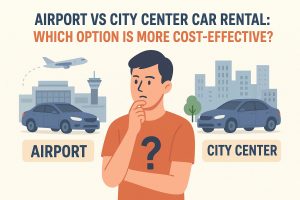Self-driving in Morocco can be an exciting way to discover the country. You get to explore at your own pace, visit off-the-beaten-path destinations, and stop when and where you want. But for travelers who aren’t used to local driving habits or road conditions, it might feel a little challenging at first. So—is it easy to self-drive in Morocco? Let’s take a closer look.
Road Conditions in Morocco for Self-Driving
Morocco has a solid road network. Highways (called “autoroutes”) connecting major cities like Casablanca, Rabat, Marrakech, and Tangier are in good condition. They’re well-maintained, clearly signposted in Arabic and French, and easy to drive on.
In contrast, rural or mountain roads can be narrow and sometimes poorly paved. In areas like the Atlas Mountains or southern villages, expect winding roads, sharp turns, and the occasional pothole. These routes are scenic but require more attention.
Still, if you drive slowly and remain cautious, even these parts of the country can be navigated comfortably.
Self-Driving in Morocco: What to Know About Local Driving Culture
One of the biggest adjustments when self-driving in Morocco is dealing with local driving styles. Drivers may seem aggressive or unpredictable. Honking is common—even as a friendly gesture—and roundabouts can feel chaotic at times.
Here’s how to stay calm:
- Don’t rush—drive at your own pace.
- Always use your mirrors and signals.
- Stay defensive, especially in busy cities.
It might take a day or two to adjust, but most travelers get used to it fairly quickly.
Navigation, Fuel & Signs When Driving in Morocco
Fuel stations are easy to find along highways and in most towns. They often have attendants who fill the tank for you. Keep some cash, just in case.
Road signs are in both Arabic and French, and most popular tourist areas are easy to navigate. GPS apps like Google Maps or Waze work well, but it’s a good idea to download offline maps before your trip.
Renting a Car in Morocco
Renting a car is easy and affordable in Morocco. Rental agencies are available in all major airports, cities, and even tourist hotspots like Agadir or Chefchaouen. You’ll need:
- A valid driver’s license (and possibly an international permit)
- A credit card for the deposit
- A passport
Before driving off, inspect the vehicle and take photos. Make sure you understand the insurance terms, especially regarding theft or tire damage.
Tip: Choose a compact car for narrow streets in the medinas, or a 4×4 if you’re heading into the mountains or desert.
Parking Tips
Parking in Morocco can be tricky, especially in busy areas or ancient medinas. You’ll often find locals who guide you to a spot—they expect a few dirhams as a tip. It’s totally normal and appreciated.
Paid parking lots and garages are also available in most cities. Always lock your car and avoid leaving valuables visible inside.
Scenic Routes Worth Driving
Self-driving in Morocco opens the door to unforgettable road trips. Some routes worth exploring:
- The Tizi n’Tichka Pass between Marrakech and Ouarzazate (breathtaking mountain views)
- The coastal road from Essaouira to Agadir
- The desert route from Merzouga to Zagora
You won’t get these views from a bus or train.
Pros and Cons of Self-Driving in Morocco
Pros:
- Flexibility to stop anywhere
- Access to remote sites
- Cost-effective for groups or families
Cons:
- City traffic can be overwhelming
- Road signage may confuse non-French/Arabic speakers
- Some remote roads require extra caution
Final Thoughts: Is Self-Driving in Morocco Easy?
Self-driving in Morocco is totally doable for most travelers, especially those with a bit of international driving experience. It offers freedom, adventure, and a deeper connection to the country. Just take it slow, stay alert, and enjoy the ride.
🔗 Also read:
- Read more: Is it safe for tourists to drive in Morocco?



